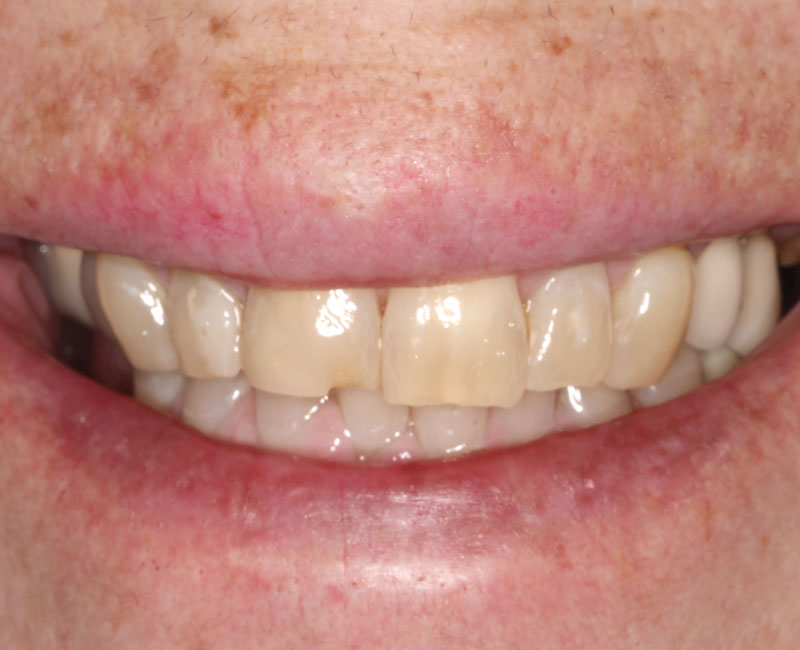A chipped tooth happens when a fragment of your tooth’s outer protective layer (enamel) breaks off. Trauma to your mouth or biting something hard are both potential causes. Depending on how serious the chip is, you may need dental work to repair your tooth and protect it from further damage. You may need a cosmetic procedure to restore your smile.
Advertisement
Cleveland Clinic is a non-profit academic medical center. Advertising on our site helps support our mission. We do not endorse non-Cleveland Clinic products or services. Policy

Image content: This image is available to view online.
View image online (https://my.clevelandclinic.org/-/scassets/Images/org/health/articles/chipped-tooth)
Having a chipped tooth means a fragment of your tooth enamel has broken off. Tooth enamel is the tough outer layer of your teeth that protects the sensitive tissue inside. Tooth enamel is sturdy, but it’s not indestructible. Injuries to your tooth — from a fall to accidentally biting down on your fork — can cause the enamel to break off, leaving you with a chip.
Advertisement
Cleveland Clinic is a non-profit academic medical center. Advertising on our site helps support our mission. We do not endorse non-Cleveland Clinic products or services. Policy
Slightly chipped teeth don’t usually cause major issues, but they can make you self-conscious about how your teeth look. Severe chips that expose the delicate tissue beneath the enamel require dental work to protect your tooth.
Either way, you’ll need to see a dental provider, like a dentist or an endodontist, to check the damage.
Chipped and cracked teeth are both common reasons why people visit the dentist. With a chip, some enamel breaks off. A cracked, or fractured, tooth involves a break that runs through your tooth. Both conditions may be harmless or serious enough to require dental work. You’ll need to see a dental provider to know for sure.
Often, the only sign of a chipped tooth is a missing tooth fragment. If your front tooth is chipped, you’ll likely be able to tell when you look in the mirror. You may feel a rough, jagged edge where the chip is if you run your tongue along your teeth.
Losing a tooth fragment big enough to expose the nerve inside can cause tooth pain. Your teeth may feel sensitive when you’re chewing or consuming foods or drinks that are especially hot or cold.
Causes include:
Advertisement
Anything that puts you at risk of injury to your mouth (like playing a contact sport) increases the chances of a chipped tooth. But sometimes, fragments break off for no apparent reason. You may be biting into something moderately soft and still chip your tooth.
When this happens, it’s likely because your enamel was already worn down and prone to injury. Things that make your teeth more vulnerable to injury include:
Minor chips don’t usually cause problems. But a major chip that exposes the sensitive tissue inside to bacteria can cause a tooth infection. Seeing a healthcare provider sooner rather than later can prevent this from happening.
Your dental provider will inspect your teeth to check for chips or cracks. Depending on how severe the damage is, you may need dental X-rays.
Treatment options range from no treatment (for small chips) to major dental work to prevent further damage to your teeth (restorative dentistry). Your dental provider may also recommend repairs to improve the appearance of a chipped tooth (cosmetic dentistry).
Methods include:
Advertisement
Your provider can explain what to expect after they assess the damage to your tooth. For severe chips, you may need major dental work, like a root canal and a crown. Most chips are only cosmetic issues, though. If you’re self-conscious about your smile, treatments like bonds, veneers and fillings can help.
For minor chips, your provider may just buff the jagged edges to help your tooth blend in better with the others. Over time, your tooth may smooth out even more on its own.
You can’t always keep from chipping a tooth. But you can take steps to make your teeth less susceptible to injury. You can:
If you’ve chipped a tooth, first things first: schedule an appointment with your dental care provider. You can’t fix a chipped tooth at home. Only a provider can assess the damage and let you know what type of treatment you might need.
But there are things you can do to care for yourself while you wait for your visit:
Advertisement
Schedule an appointment with your healthcare provider as soon as possible after you notice the chip. A slightly chipped tooth may not be a major issue. But only a dental provider can assess how serious a chipped tooth is. Leaving a chipped tooth untreated can cause other problems if there’s damage beyond the enamel.
Advertisement
Questions to ask include:
It’s hard not to panic when you injure a tooth, and then the mirror confirms the worst: a chip. But take comfort in knowing your smile doesn’t have to look uneven forever. Lots of people get cracks or chips in their teeth. Treatments are available that can protect your tooth from further injury and restore your appearance. And if your chip is minor, a simple polish may get you feeling confident about your smile again.

Sign up for our Health Essentials emails for expert guidance on nutrition, fitness, sleep, skin care and more.
Learn more about the Health Library and our editorial process.
Cleveland Clinic’s health articles are based on evidence-backed information and review by medical professionals to ensure accuracy, reliability and up-to-date clinical standards.
Cleveland Clinic’s health articles are based on evidence-backed information and review by medical professionals to ensure accuracy, reliability and up-to-date clinical standards.
Dentistry plays an important role in oral health. Cleveland Clinic’s experts can design a personalized plan that will keep you smiling for the long haul.
